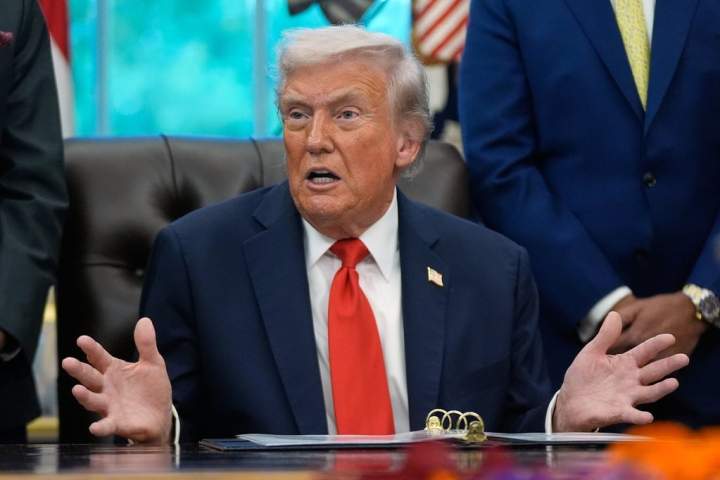Top Stories
Trump Calls Tariffs ‘Vital’ Ahead of Supreme Court Hearing on Nov. 5

UPDATE: U.S. President Donald Trump has declared tariffs as “vital” for the nation, just ahead of a pivotal Supreme Court hearing scheduled for November 5, 2023. This case will assess whether Trump can unilaterally impose tariffs under emergency powers, potentially bypassing Congress.
During a press briefing in the Oval Office, Trump emphasized the significance of the upcoming case, labeling it “one of the most important cases we’ve ever had.” The Supreme Court will evaluate Trump’s tariffs against Canada, Mexico, and China, which he implemented in response to allegations of fentanyl trafficking. These tariffs also include reciprocal tariffs on various other nations.
The president contends that tariffs serve as crucial negotiating tools in trade deals and are necessary for addressing national security issues. “If this country is not allowed to have tariffs… we are put in a position where we’re going to be a third-world country,” Trump stated emphatically. “We can’t let that happen.”
Legal challenges have emerged, with multiple courts ruling against Trump’s use of the International Emergency Economic Powers Act (IEEPA). These rulings assert that the president’s tariff imposition violates the U.S. Constitution, which grants tariffing powers to Congress. The courts have noted that the IEEPA does not explicitly mention tariffs as a valid response to emergencies, siding with numerous state attorneys general and small businesses that contested the legality of the tariffs.
Despite these rulings, the tariffs remain in effect as the Trump administration continues to appeal the decisions. The courts have indicated that Trump could utilize other legal frameworks, such as Section 232 of the U.S. Trade Expansion Act, to impose tariffs on specific sectors like foreign steel and aluminum.
Trump also highlighted the unprecedented tariff revenues being generated, claiming they are helping to address America’s mounting national debt, which has now reached nearly $38 trillion. “With tariffs, we’re a strong, sound country,” he asserted. “We’re a very rich country… Without tariffs, it’s a slog for this country.”
“Revoking the tariffs could mean financial ruin for the United States,” the U.S. Justice Department warned in legal filings related to the case.
In his remarks, Trump also pointed to his success in resolving international tensions through tariff threats, specifically mentioning India and Pakistan. He recounted telling both nations, “If you want to fight, that’s OK, but you’re going to pay tariffs, and they’re going to be very substantial,” which led to de-escalation.
Despite Canada taking measures to enhance border security and combat fentanyl trafficking, Trump has not lifted the IEEPA tariffs. A presidential memo from last month indicated that Canada must do more to confront these issues. Currently, goods compliant with the Canada-U.S.-Mexico Agreement (CUSMA) face exemptions, meaning less than 15% of Canadian exports endure a 35% duty.
Trade discussions between Canada and the Trump administration are ongoing, with Ottawa seeking to negotiate lower Section 232 tariffs on steel, aluminum, and energy. Canada-U.S. Trade Minister Dominic LeBlanc stated last month that Canada maintains its position that the fentanyl-related tariffs should be removed.
As the Supreme Court prepares to hear this critical case, the implications of their decision could reshape U.S. trade policy and the president’s authority to impose tariffs. All eyes will be on the courtroom on November 5.
-

 World3 months ago
World3 months agoScientists Unearth Ancient Antarctic Ice to Unlock Climate Secrets
-

 Entertainment3 months ago
Entertainment3 months agoTrump and McCormick to Announce $70 Billion Energy Investments
-

 Lifestyle3 months ago
Lifestyle3 months agoTransLink Launches Food Truck Program to Boost Revenue in Vancouver
-

 Science3 months ago
Science3 months agoFour Astronauts Return to Earth After International Space Station Mission
-

 Technology2 months ago
Technology2 months agoApple Notes Enhances Functionality with Markdown Support in macOS 26
-

 Top Stories2 weeks ago
Top Stories2 weeks agoUrgent Update: Fatal Crash on Highway 99 Claims Life of Pitt Meadows Man
-

 Sports3 months ago
Sports3 months agoSearch Underway for Missing Hunter Amid Hokkaido Bear Emergency
-

 Politics3 months ago
Politics3 months agoUkrainian Tennis Star Elina Svitolina Faces Death Threats Online
-

 Technology3 months ago
Technology3 months agoFrosthaven Launches Early Access on July 31, 2025
-

 Politics3 months ago
Politics3 months agoCarney Engages First Nations Leaders at Development Law Summit
-

 Entertainment3 months ago
Entertainment3 months agoCalgary Theatre Troupe Revives Magic at Winnipeg Fringe Festival
-

 Politics2 weeks ago
Politics2 weeks agoShutdown Reflects Democratic Struggles Amid Economic Concerns


















